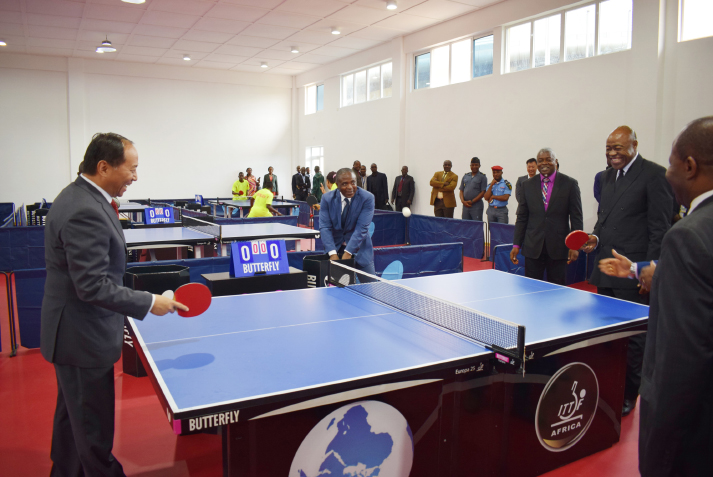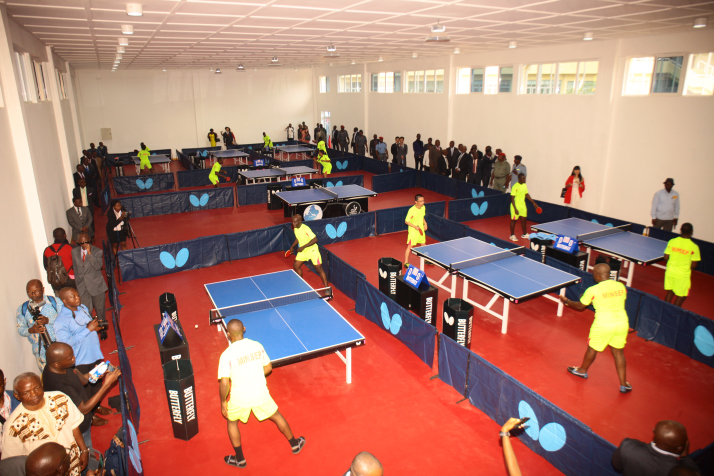|
||||||||||
| Home Nation World Business Opinion Lifestyle ChinAfrica Multimedia Columnists Documents Special Reports |
|
||||||||||
| Home Nation World Business Opinion Lifestyle ChinAfrica Multimedia Columnists Documents Special Reports |
| ChinAfrica |
| Eyes on the Ball |
| China helps African countries promote the popularity of table tennis |
| By Éric Vincent Fomo | VOL.11 December ·2019-12-14 |

Chinese Ambassador Wei Wenhua and Cameroonian Minister of Sports Pierre Ismaël Bidoung Mkpatt at the Cameroon National Table Tennis Training Center on its opening day (SOPECAM)
In Cameroon, one of the most recent fruits of cooperation with China is an entire building specifically designed and built for table tennis. Inside, day and night, table tennis players of all ages take turns on the eight state-of-the-art tables. Some play hotly contested matches, while others are sharpening their skills under the instructions of the coaches.
Covering 110 square meters, the building, in addition to a table tennis hall, includes two changing rooms, two shower rooms and two fully furnished offices. The local store is equipped with the latest equipment essential for playing table tennis, such as rackets, balls and nets. The China-financed and built center stands nearby the Yaoundé Multipurpose Sports Complex, another project sponsored by China.
"This table tennis hall is the result of a promise made by Chinese diplomats at the 10th edition of the Chinese Ambassador's Cup Table Tennis Competition in July 2017," said Alfred Bagueka Assobo, President of the Cameroonian Table Tennis Federation. At that time, Ambassador Wei Wenhua promised to build a table tennis training center for Cameroon. Later, on December 27 that year, the two countries signed an agreement to officially launch the project. Four months later, the Cameroon National Table Tennis Training Center was jointly inaugurated by then Cameroonian Minister of Sports and Physical Education Pierre Ismaël Bidoung Mkpatt and Wei.
According to Wei, the Chinese contribution is aimed at "further promoting the development of table tennis in Cameroon and raising Cameroon's international ranking in this sport." This is in addition to the many initiatives put in place by China to develop table tennis in Cameroon, of which the most important is the China-sponsored Chinese Ambassador's Cup Table Tennis Competition, already in its 10th edition. In addition, China regularly donates to Cameroon table tennis equipment and sends Chinese coaches on training mission to help Cameroonian table tennis players up their skills. The best table tennis practitioners in Cameroon regularly receive internships and scholarships to go professionalize themselves in China.

The newly opened Cameroon National Table Tennis Training Center (SOPECAM)
Learning from the best
In the run-up to the recent 2019 African Games, two-thirds of the participating nations sent their table tennis teams to China to learn and improve. Teams from Djibouti, Madagascar, and many other countries have completed internships in China. Others have called on some of China's most renowned technical coaches and former champions to help build African teams with solid strategies.
In Senegal, the Chinese Ambassador's Cup Table Tennis Competition in Dakar has become the main national event for table tennis fans in the country. A total of 129 athletes of 10 nationalities (101 men and 28 women) and five ambassadors participated in the 11th edition of this tournament in November 2018. The cup was won in men's singles by Dame Ndiaye and in women's singles by Adama Dramé, who later both distinguished themselves at the 2019 African Games.
"China is supporting the Senegalese table tennis federation throughout the organization of this tournament and beyond, contributing to the training of Senegalese players by granting scholarships and three-month internships in China each year to Senegalese players and coaches," said Papa Anthoumane Diagne, President of the Senegal Table Tennis Federation.
According to former Chinese Ambassador to Djibouti Wang Xiaodu, in about 10 years from 2008 to 2018, more than 200 Djiboutian athletes have benefited from table tennis training and internships in China. Among them, player and coach Mohamed Houmed Saïdo acknowledged that he owes his current world class skills to Chinese expertise.
"At each training camp, every time we meet with a Chinese table tennis coach, we gain something. They are excellent in all aspects and are always willing to share their experience and make efforts to remain leaders in practice and world champions in all fields of table tennis," said Saïdo.
Similar examples can be seen in the majority of African countries, where Chinese efforts are gradually bearing fruit in the development of table tennis. In many cases, China is donating infrastructure and equipment to advance the sport; Chinese technicians are providing trainings to local players to improve their game techniques and strategies, as well as organizing internships to raise the level of local athletes. Even the strongest African table tennis countries, namely Egypt and Nigeria, have long benefited and continue to benefit from Chinese expertise.
New Eldorado
Egypt and Nigeria that are competing for African leadership in this discipline, have a longstanding experience in table tennis. Each of these countries counts at least 500,000 practitioners of the sport. They also have multiple infrastructures that facilitate the daily practice of table tennis. In Nigeria, for example, the high population density has been an advantage for the development of table tennis, which has become a national hobby almost as popular as football.
"Nigerians have always loved table tennis, because it is the only sport, along with football, that can be played right there on the streets," said Olufunke Oshonaike, a former table tennis player who competed at the Rio de Janeiro Olympic Games in 2016. "I started playing on the table in my living room, and from there I started playing outside and then I was spotted. If people see that you are very good at table tennis, they will invite you to join a team and they will train you to become a champion."
In Nigeria, Chinese donations of tables, rackets and balls have encouraged the expansion and popularization of the sport in the streets. In many cities, several intersections count at least one table tennis table, where players take turns on a daily basis. Table tennis has become a grassroots game of socialization. All the greatest Nigerian table tennis players have started and been discovered on the streets. They then took part in the dozen or so international table tennis tournaments nationwide each year. On these occasions, Chinese coaches were helping on the basis of a long-standing agreement between the two countries, focused on the development of table tennis in Nigeria.
Table tennis players such as Olajide Adeyemi Omotayo, gold medalist in men's singles at the last African Games, as well as Offiong Edem and Cécilia Akpan, gold medalists in women's doubles, have benefited from this Chinese cooperation to become more professional. However, the main star remains Quadri Aruna. This former Olympic quarter-finalist defeated by the world's number one, Chinese player Ma Long, dreams of making his country the next Eldorado of table tennis and China's great competitor in this discipline.
(Comments to zanjifang@chinafrica.cn)
|
||||||||||||
| About Us | Contact Us | Advertise with Us | Subscribe |
| Copyright Beijing Review All rights reserved 京ICP备08005356号-5 京公网安备110102005860号 |